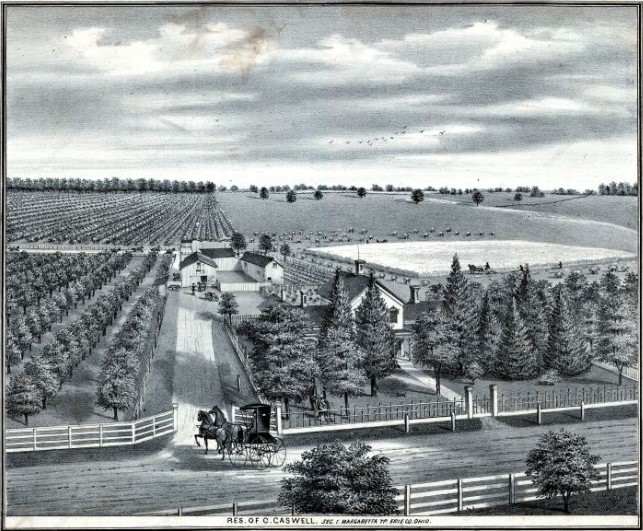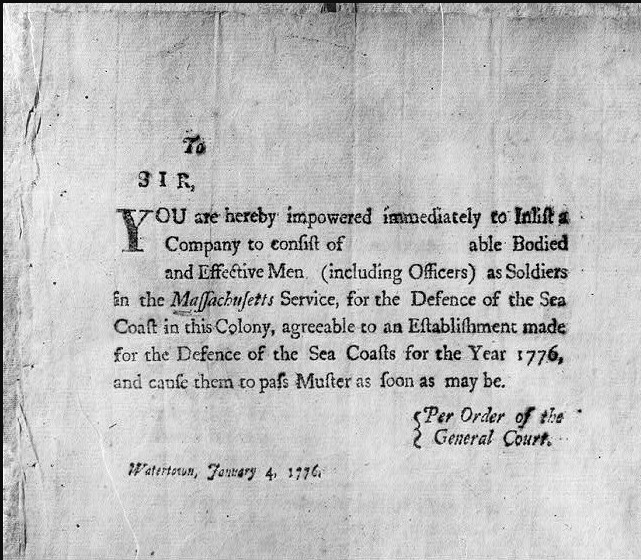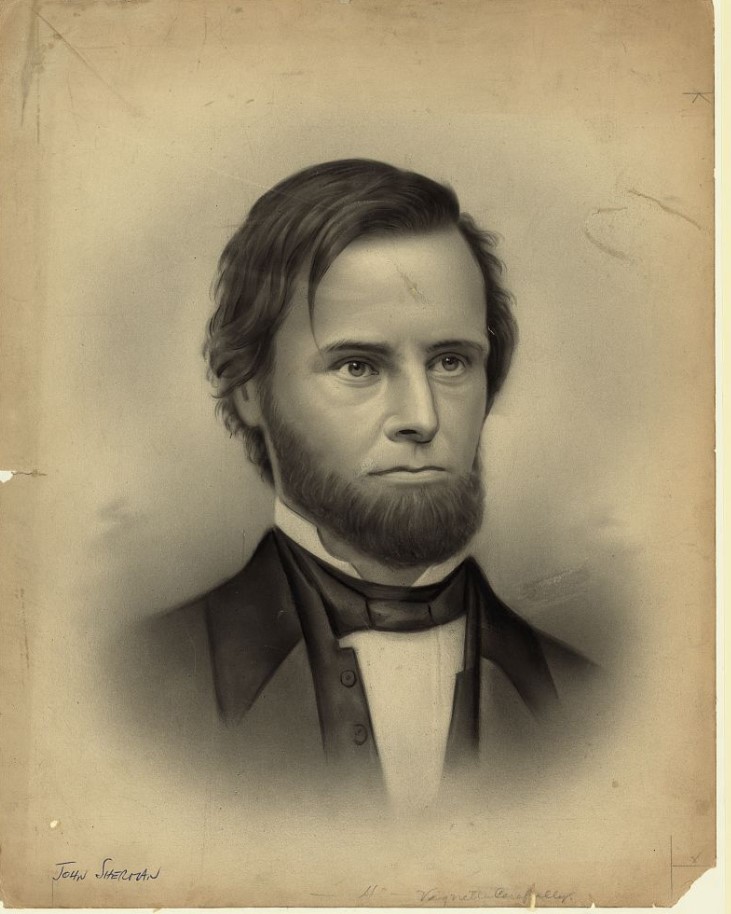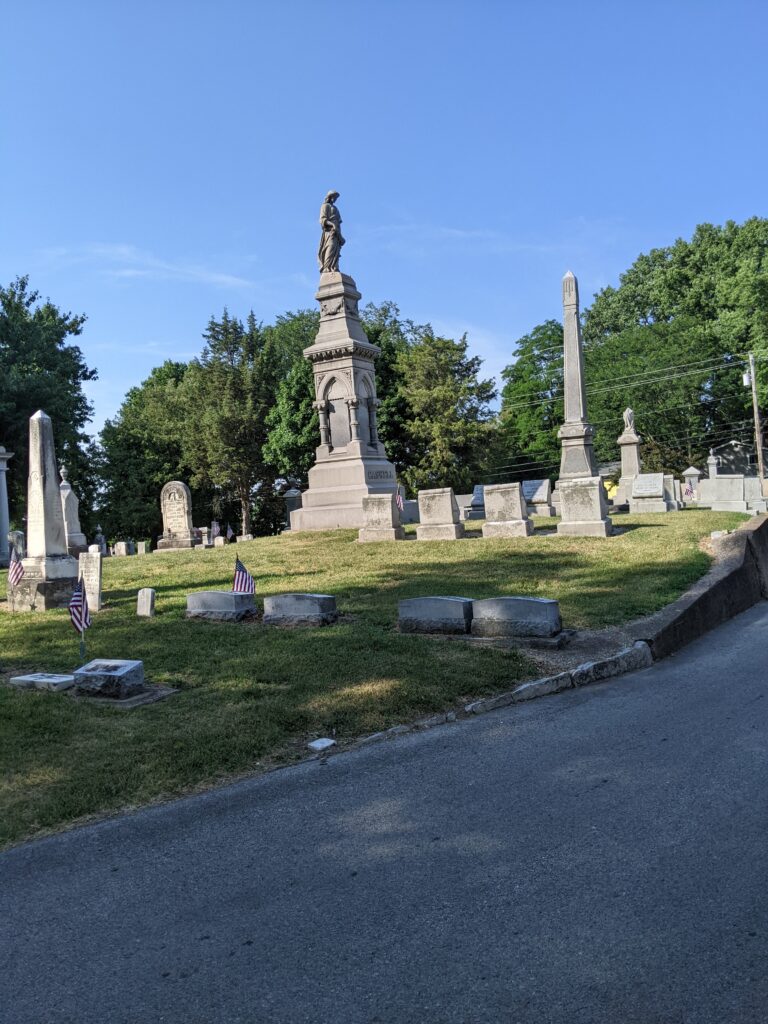
Previously, I provided an overview of the life of Calvin Caswell, the father in law of Wells Waite Miller (who is the Civil War soldier I’ve been researching). This includes information about his grandfather, Thomas Caswell, who served as a Revolutionary War soldier; his father, Thomas, who fought in the War of 1812; how Calvin came to Ohio; and his two marriages (to sisters) and his children, including Mary Helen who married Wells in 1864. I’ve also researched the tragic “Castalia Massacre,” which occurred in 1813 on land that, in 1851, Calvin bought and built his house upon. Here’s more!
Calvin Caswell’s Home

In Elected to Serve: Erie County, Ohio, 1838-2003, there’s a description of his property taken from the 1874 Erie County Atlas: “He has six hundred acres of land, all under excellent cultivation. His orchards are among the finest in the county; one consisting of one thousand young apple-trees, and one of the same number of peach trees, are both in thrifty condition, and include the best known varieties of fruit.” He was also the county’s largest producer of wheat.
This “farm stretches its broad acres in perfect cultivation and during the last year he has remodeled his spacious home, until it has become a palatial residence. With towers and immense piazzas, it seems more like a Saratoga hotel than a private residence.”
Political Offices
In Elected to Serve, Calvin Caswell is listed as serving as Erie County Commissioner from October 1863-November 1868 as a Democrat; I would have expected that he and Wells had similar political views, and I have reasons to believe he was a Republican. I’ll look for confirmation! Plus, Calvin also held “several important township offices . . . He served the county well and did his duty faithfully and to the satisfaction of the people” and was active in the Erie County Agricultural Society.
Stories of War Duty

Stories of Calvin’s grandfather, Thomas, who fought in the Revolutionary War included how he had “such slender school opportunities during the winter months, as were available in those days, but being a wide-awake and diligent student in the great schools of self-culture and self-instruction, not only in his earlier years but through all the changing periods of varied and busy life, so that he enjoyed the reputation of being an exceptionally well informed and well read man on questions of private interest and public concern. He was naturally an apt and ready student in the school of life and showed remarkably keen and intelligent interest in all affairs of public and private welfare to the end of his long and active life.”
Two of Calvin’s brothers, Obed and Walter Caswell, fought in the Civil War—initially with Wells in the 8th OVI. As for Calvin, “During the War, Mr. C. used the most strenuous extertions in behalf of our army, by personal and generous donations of both money and provisions, and by soliciting the same from the ever ready and willing citizens of Margaretta.” Plus, when Wells was badly wounded in what’s often called Pickett’s Charge at Gettysburg, he recovered at the home of Calvin Caswell.
Calvin Caswell: What Else We Know

Calvin Caswell was “a representative farmer, a progressive and energetic worker, an exemplary Christian and a good citizen.” He was a charter member of the Erie County Farmer’s Insurance Company and, in the spring of 1875, he was one of the leading citizens who bought the water power company. Voting in every election since 1840, Calvin served as the delegate to the congressional convention that nominated John Sherman for Congress in 1856.
Funeral Description

In the Sandusky Register on May 20, 1907, his funeral service was held in the family home in the “presence of hundreds of kindred and friends, farmers and citizens from the varied walks of business and professional life.” His body “reposed in a magnificent casket of the McKinley pattern, surrounded by the rarest of flowers, while at the head rested a pillow of carnations. On the walls of the spacious parlor hung the portraits of Grant, Garfield, McKinley and other famous public men, some of whom the deceased had personally known in life. It was a fitting setting to the impressive scene which marked the close of an active citizenship in Oho of nearly 70 years, a citizenship characterized by unfaltering adherence to the principles of human library and human rights and the great political party for which those distinguished public leaders stood.”
His granddaughter Corinne’s husband, Oscar Kriebel, delivered a “thoughtful address” that shared that “though dead he liveth.” The Castalia Congregational Church choir, meanwhile, sang “Nearer My God to Thee,” “Abide With Me,” and “Asleep in Jesus.” Buried in Castalia Cemetery in a steel vault near the “magnificent marble shaft, surrounded by a human figure sculpture,” one of his pallbearers was Wells’ son Amos C. Miller.
In Memory of Calvin Caswell
Calvin, Elected to Serve notes, was “widely known and esteemed by public men of all shades and political belief” as he “stood for the best things in public affairs, but he was absolutely above suspicion in all his manifold dealings, both as a public man and as a private individual, with his fellow man. Unquestioned integrity, absolute and unimpeachable honesty, and resourceful, wholesome influence characterized by his many long years of public life, in which he was an example of the best type of American citizenship. As a private citizen, as a father, a husband, a counselor and friend, Mr. Caswell was ever loving, kind, helpful and generous. Himself pure in thought and purpose, he suffered no morally loose and unclean actions in his presence so far as he could control those things. Incapable of meanness or petty personalities, he was generous to a fault, indulgent toward those whom he loved, loyal to his friends and forgiving to his enemies and withal a man of remarkable self control and poise, a man who hated meanness and crookedness and petty smallness, dishonesty and shame in high and low places with all the intensity of his nature and who loved that which was clean, pure and loving, kind and honest upright with all the strength of his manly heart.”
Wells Waite Miller: Exploration of His Life and Times
I’d like to share my research about Wells Waite Miller from Castalia, Ohio with you. Although I’ve written the material in the order in which I’ve found research material, I now roughly have the posts in the order in which the events occurred.
Blog posts I’ve written on the subject so far include:
- Wells Waite Miller’s America
- Thomas Miller: Ancestors in England
- Great Puritan Migration
- Scandal in the Colonies
- Calm in the Eye of the Storm
- Aaron Miller: Born Under the Drumbeats of War
- Grandparents, Parents, and Siblings
- Enfield, New York
- Ohio Bound
- Oberlin Years: Fierce Debates About Abolitionism
- Enlisting in the Civil War
- A Look at Lodowick G. Miller
- Captured: Camp Parole
- Marching Towards Gettysburg
- Picketts Charge and 43 Bonus Years
- Glory Days to Invalid Corps
- Castalia Massacre
- Calvin Caswell
- Calvin Caswell, Continued (current post)
- Obed Caswell And Walter Caswell: Story of Brothers
- Miller Family Mystery Solved?
- Miller Family Mystery Solved, Part Two
- Amos and Corinne Miller
- Oscar Schultz Kriebel, Part One
- Oscar Schultz Kriebel, Part Two
- Oscar Schultz Kriebel, Part Three
- Oscar Schultz Kriebel, Part Four
- Erie County, Ohio for Congress
- Wells Waite Miller: Republic Candidate for Ohio Governor
- Ohio Antietam Battlefield Commission
- “Speaking the Names: A Tale of Two Brothers” at Ashland University’s Black Fork Review
I invite you to become part of this journey, sharing my posts with people who enjoy reading historical biographies.
If you read this material and have additional information that’s directly tied to Miller or sets context about his life—or you’ve spotted errors—please email me at kbsagert@aol.com.